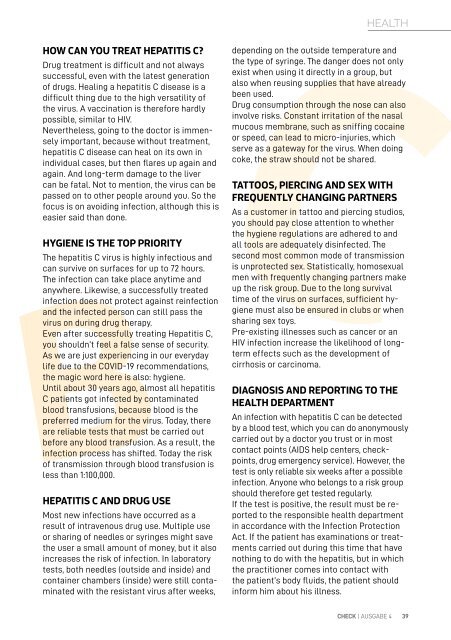CHECK Berlin #4
Erfolgreiche ePaper selbst erstellen
Machen Sie aus Ihren PDF Publikationen ein blätterbares Flipbook mit unserer einzigartigen Google optimierten e-Paper Software.
HEALTH<br />
HOW CAN YOU TREAT HEPATITIS C?<br />
Drug treatment is difficult and not always<br />
successful, even with the latest generation<br />
of drugs. Healing a hepatitis C disease is a<br />
difficult thing due to the high versatility of<br />
the virus. A vaccination is therefore hardly<br />
possible, similar to HIV.<br />
Nevertheless, going to the doctor is immensely<br />
important, because without treatment,<br />
hepatitis C disease can heal on its own in<br />
individual cases, but then flares up again and<br />
again. And long-term damage to the liver<br />
can be fatal. Not to mention, the virus can be<br />
passed on to other people around you. So the<br />
focus is on avoiding infection, although this is<br />
easier said than done.<br />
HYGIENE IS THE TOP PRIORITY<br />
The hepatitis C virus is highly infectious and<br />
can survive on surfaces for up to 72 hours.<br />
The infection can take place anytime and<br />
anywhere. Likewise, a successfully treated<br />
infection does not protect against reinfection<br />
and the infected person can still pass the<br />
virus on during drug therapy.<br />
Even after successfully treating Hepatitis C,<br />
you shouldn‘t feel a false sense of security.<br />
As we are just experiencing in our everyday<br />
life due to the COVID-19 recommendations,<br />
the magic word here is also: hygiene.<br />
Until about 30 years ago, almost all hepatitis<br />
C patients got infected by contaminated<br />
blood transfusions, because blood is the<br />
preferred medium for the virus. Today, there<br />
are reliable tests that must be carried out<br />
before any blood transfusion. As a result, the<br />
infection process has shifted. Today the risk<br />
of transmission through blood transfusion is<br />
less than 1:100,000.<br />
B<br />
HEPATITIS C AND DRUG USE<br />
Most new infections have occurred as a<br />
result of intravenous drug use. Multiple use<br />
or sharing of needles or syringes might save<br />
the user a small amount of money, but it also<br />
increases the risk of infection. In laboratory<br />
tests, both needles (outside and inside) and<br />
container chambers (inside) were still contaminated<br />
with the resistant virus after weeks,<br />
C<br />
depending on the outside temperature and<br />
the type of syringe. The danger does not only<br />
exist when using it directly in a group, but<br />
also when reusing supplies that have already<br />
been used.<br />
Drug consumption through the nose can also<br />
involve risks. Constant irritation of the nasal<br />
mucous membrane, such as sniffing cocaine<br />
or speed, can lead to micro-injuries, which<br />
serve as a gateway for the virus. When doing<br />
coke, the straw should not be shared.<br />
TATTOOS, PIERCING AND SEX WITH<br />
FREQUENTLY CHANGING PARTNERS<br />
As a customer in tattoo and piercing studios,<br />
you should pay close attention to whether<br />
the hygiene regulations are adhered to and<br />
all tools are adequately disinfected. The<br />
second most common mode of transmission<br />
is unprotected sex. Statistically, homosexual<br />
men with frequently changing partners make<br />
up the risk group. Due to the long survival<br />
time of the virus on surfaces, sufficient hygiene<br />
must also be ensured in clubs or when<br />
sharing sex toys.<br />
Pre-existing illnesses such as cancer or an<br />
HIV infection increase the likelihood of longterm<br />
effects such as the development of<br />
cirrhosis or carcinoma.<br />
DIAGNOSIS AND REPORTING TO THE<br />
HEALTH DEPARTMENT<br />
An infection with hepatitis C can be detected<br />
by a blood test, which you can do anonymously<br />
carried out by a doctor you trust or in most<br />
contact points (AIDS help centers, checkpoints,<br />
drug emergency service). However, the<br />
test is only reliable six weeks after a possible<br />
infection. Anyone who belongs to a risk group<br />
should therefore get tested regularly.<br />
If the test is positive, the result must be reported<br />
to the responsible health department<br />
in accordance with the Infection Protection<br />
Act. If the patient has examinations or treatments<br />
carried out during this time that have<br />
nothing to do with the hepatitis, but in which<br />
the practitioner comes into contact with<br />
the patient‘s body fluids, the patient should<br />
inform him about his illness.<br />
<strong>CHECK</strong> | AUSGABE 4<br />
39


















